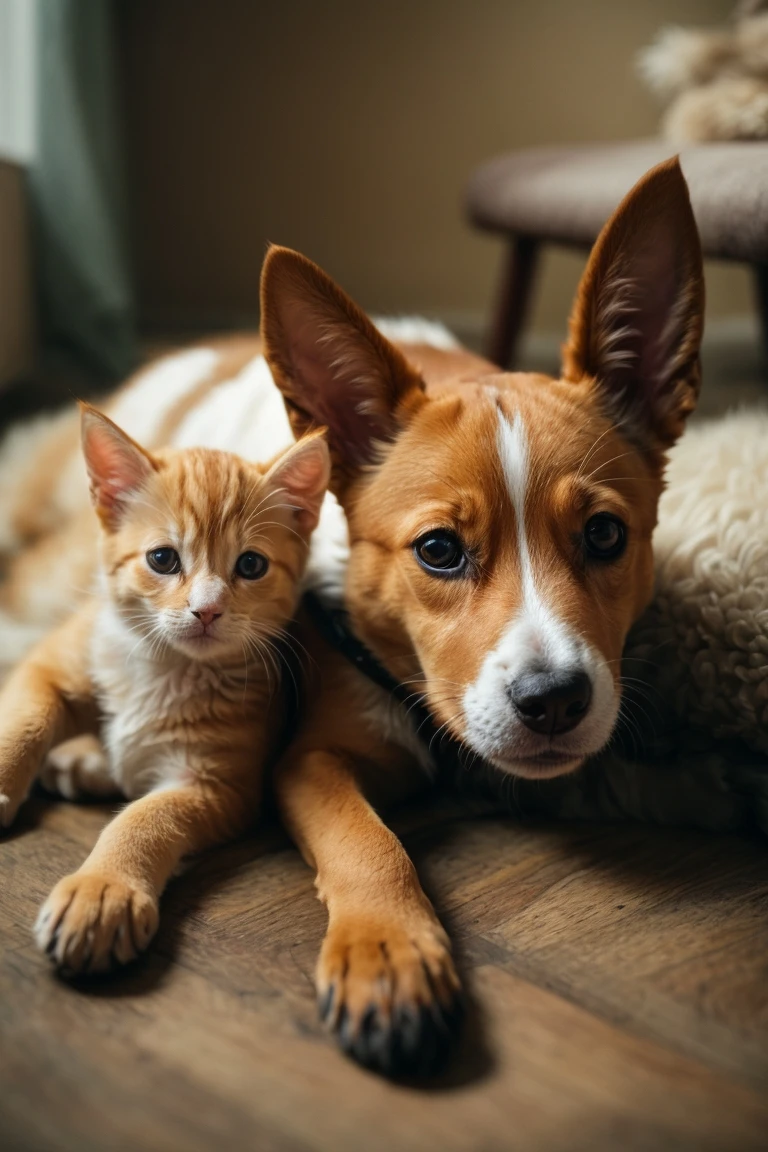Are Basenjis Good with Cats? What You Need to Know

The Basenji, often called the "barkless dog from Africa", is a highly intelligent and energetic hound breed with strong prey drive instincts. So how do they tend to fare when added to a home with feline residents? Can Basenjis successfully coexist with cats, or is chasing inevitable with this hunting breed?
This article will dive into the Basenji's typical behavior towards cats and provide tips to increase the chances of them getting along peacefully. Understanding the Basenji's nature helps ensure a harmonious multi-pet home.
The Basenji's Prey Drive Towards Cats
The Basenji was originally bred to hunt, track, and flush small game in the forests and plains of Africa. Chasing swift, fleeing creatures is deeply ingrained in their DNA. Key aspects of their prey drive include:
- Strong urge to chase anything that runs from them or exhibits prey-like behaviors. This absolutely includes cats that run.
- High energy and ingenuity when pursuing prey. Will seek any opportunity to give chase. Require secure containment.
- Resourcefulness at stalking, cornering, and treeing quarry through stealthy movement and clever problem-solving abilities.
- Tenacity pursuing prey despite distraction or obstacles in their path. Difficult to redirect once their sights are set.
- Quick reflexes allow Basenjis to rapidly launch into pursuit mode at the slightest provocation. Cat owners must be vigilant.
Without proper conditioning and management, Basenjis will absolutely view indoor cats as fair game and likely harass or injure them. Their instincts to chase small fleeing creatures are so hard-wired.
Considerations for Basenjis Sharing a Home with Cats
While challenging, Basenjis can learn to cope peacefully with cats under the right circumstances:
- Early supervision and training are essential. Basenji puppies must be taught cats are companions, not toys to chase. Proper conditioning from day one offers the best odds.
- Individual temperament varies. Some Basenjis will display more predatory behavior than others. Work with a breed-experienced trainer or behaviorist to evaluate each dog's urges.
- High energy requirements. Basenjis left under-exercised will seek inappropriate outlets like chasing cats. Ensure they get adequate physical and mental exercise daily.
- Secure separation when unsupervised. Even friendly Basenjis should not have full access to roam with cats alone. Use gates, crates, and closed doors to prevent injury.
- Reinforce wanted behaviors. Praise and reward calm, polite interactions between your Basenji and cats. Correct unwanted chasing immediately.
- Kittens and elderly cats at greatest risk. Prey drive is often more intense towards young, small, and fast moving cats that exhibit prey qualities.
While difficult, Basenjis can be trained to accept indoor cats with dedicated effort. However, their strong prey instincts mean cats should never be fully trusted with Basenjis unsupervised.
Introducing a Basenji to a Cat
When introducing a Basenji to your home's resident cats:
- Allow the cats access to escape routes up high or behind closed doors. Never force interactions.
- Keep the Basenji leashed initially and let them observe the cats from a distance without giving chase. Redirect any fixation or stalking.
- Give tasty treats when your Basenji remains calm and quiet around the cats. Praise correct interactions.
- Allow the cats to become comfortable approaching and eating treats near the Basenji while supervised on leash. Don't allow chasing.
- Exchange scents by rubbing cloths on each animal and letting them become familiar with the smell.
- Increase supervised, controlled contact over multiple weeks. Hire a trainer if introductions seem stalled or dangerous.
- Never rush the introduction process or leave them loose together until the Basenji reliably ignores and avoids the cats.
With time, patience, and positive associations, some Basenjis can adapt to coexisting politely with cats at home. But prey drive may still be triggered if a cat runs so consult an animal behaviorist if problems arise.
Managing a Basenji and Cats
If you plan to get a Basenji for your cat household, you must make some adjustments:
- Provide vertical escape routes like cat trees, shelves, and baby gates that cats can jump but dogs can’t. This allows cats to retreat when feeling threatened.
- Install physical barriers like decorative latticework screens that let your cats move freely without being cornered. Close doors to cat-only rooms as needed.
- Ensure your cats have “safe zones” at ground level too like closets or spare bedrooms where food, water and litter boxes can be accessed without encountering the dog.
- Keep the Basenji well exercised with adequate mental and physical activity to prevent boredom. A tired Basenji is less likely to harass cats.
- Use leashes, crates, and gates to control contact when the Basenji cannot be trusted loose with cats. Directly supervise all interactions.
- Provide enrichment for your cats like puzzle feeders and new toys to prevent boredom that might lead to teasing the dog.
- Correct unwanted chasing or harassment firmly. Praise and reward gentle coexistence.
Proper management prevents disastrous situations where cats get hurt. But supervision is forever required, and anxiety medications may be needed in some cases.
Signs of Trouble Between Basenjis and Cats
Watch for these warning signs of difficult relationships between Basenjis and cats:
- Fixating on or stalking cats
- Excessive chasing, especially of running cats
- Cornering or treeing cats aggressively
- Nipping or injuring cats during pursuit
- Fighting with cats that don't back down
- Stress symptoms in cats like hiding, urinating outside the litter box, aggression
Trouble usually stems from insufficient exercise and training of the Basenji and inadequate cat escape options. If behavior becomes threatening, contact an animal behavior specialist for guidance before injuries occur.
While sometimes challenging, Basenjis can adapt to politely cohabiting with cats they are raised with when their strong prey instincts are properly managed. Just never expect a Basenji to be trustworthy alone with free-roaming cats given their heritage as small game hunters. With preparation, patience, and dedicated training, peaceful coexistence is possible.